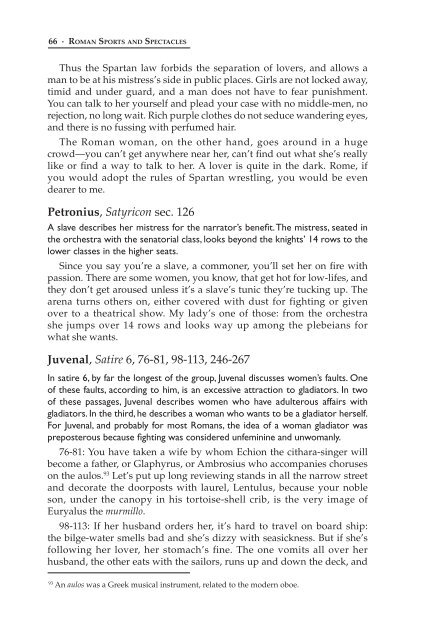Roman Sports and Spectacles - Focus Publishing
Roman Sports and Spectacles - Focus Publishing
Roman Sports and Spectacles - Focus Publishing
Create successful ePaper yourself
Turn your PDF publications into a flip-book with our unique Google optimized e-Paper software.
66 · ROMAN SPORTS AND SPECTACLES<br />
Thus the Spartan law forbids the separation of lovers, <strong>and</strong> allows a<br />
man to be at his mistress’s side in public places. Girls are not locked away,<br />
timid <strong>and</strong> under guard, <strong>and</strong> a man does not have to fear punishment.<br />
You can talk to her yourself <strong>and</strong> plead your case with no middle-men, no<br />
rejection, no long wait. Rich purple clothes do not seduce w<strong>and</strong>ering eyes,<br />
<strong>and</strong> there is no fussing with perfumed hair.<br />
The <strong>Roman</strong> woman, on the other h<strong>and</strong>, goes around in a huge<br />
crowd—you can’t get anywhere near her, can’t find out what she’s really<br />
like or find a way to talk to her. A lover is quite in the dark. Rome, if<br />
you would adopt the rules of Spartan wrestling, you would be even<br />
dearer to me.<br />
Petronius, Satyricon sec. 126<br />
A slave describes her mistress for the narrator’s benefit. The mistress, seated in<br />
the orchestra with the senatorial class, looks beyond the knights’ 14 rows to the<br />
lower classes in the higher seats.<br />
Since you say you’re a slave, a commoner, you’ll set her on fire with<br />
passion. There are some women, you know, that get hot for low-lifes, <strong>and</strong><br />
they don’t get aroused unless it’s a slave’s tunic they’re tucking up. The<br />
arena turns others on, either covered with dust for fighting or given<br />
over to a theatrical show. My lady’s one of those: from the orchestra<br />
she jumps over 14 rows <strong>and</strong> looks way up among the plebeians for<br />
what she wants.<br />
Juvenal, Satire 6, 76-81, 98-113, 246-267<br />
In satire 6, by far the longest of the group, Juvenal discusses women’s faults. One<br />
of these faults, according to him, is an excessive attraction to gladiators. In two<br />
of these passages, Juvenal describes women who have adulterous affairs with<br />
gladiators. In the third, he describes a woman who wants to be a gladiator herself.<br />
For Juvenal, <strong>and</strong> probably for most <strong>Roman</strong>s, the idea of a woman gladiator was<br />
preposterous because fighting was considered unfeminine <strong>and</strong> unwomanly.<br />
76-81: You have taken a wife by whom Echion the cithara-singer will<br />
become a father, or Glaphyrus, or Ambrosius who accompanies choruses<br />
on the aulos. 93 Let’s put up long reviewing st<strong>and</strong>s in all the narrow street<br />
<strong>and</strong> decorate the doorposts with laurel, Lentulus, because your noble<br />
son, under the canopy in his tortoise-shell crib, is the very image of<br />
Euryalus the murmillo.<br />
98-113: If her husb<strong>and</strong> orders her, it’s hard to travel on board ship:<br />
the bilge-water smells bad <strong>and</strong> she’s dizzy with seasickness. But if she’s<br />
following her lover, her stomach’s fine. The one vomits all over her<br />
husb<strong>and</strong>, the other eats with the sailors, runs up <strong>and</strong> down the deck, <strong>and</strong><br />
93 An aulos was a Greek musical instrument, related to the modern oboe.















